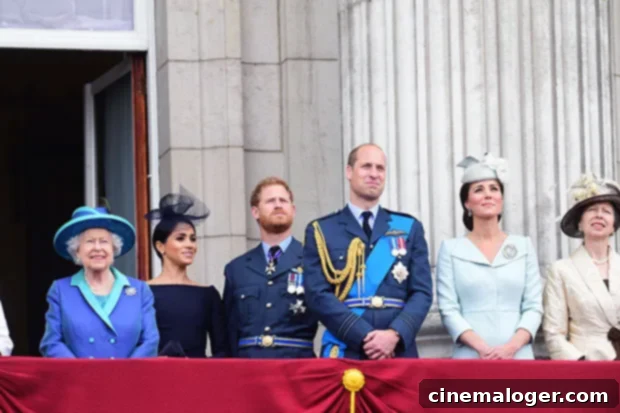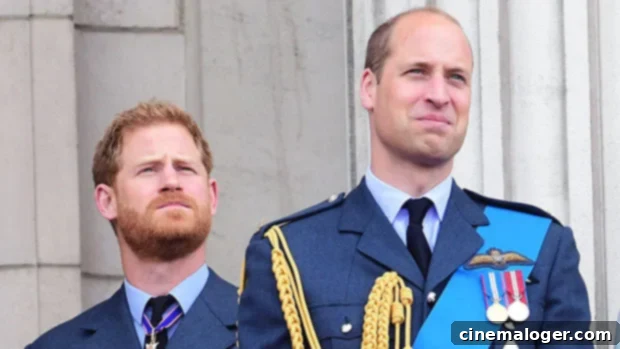Prince Harry’s “Spare”: Unveiling Royal Rifts and a Candid Plea for Family Reconciliation
If you purchase an independently reviewed product or service through a link on our website, we may receive an affiliate commission. For our affiliate policy, click here.
The highly anticipated release of Prince Harry’s memoir, Spare, has ignited a fresh wave of revelations concerning his complex and often fraught relationships with members of the British Royal Family. Ahead of the book’s official debut, the Duke of Sussex, 38, has offered a poignant glimpse into the deeply personal narrative contained within his autobiography through a series of candid television interviews. These previews suggest that Spare is not merely a recounting of his life but a direct and unvarnished account of the challenges and emotional toll experienced by him and his wife, Meghan Markle, Duchess of Sussex, during their time as working royals and their subsequent departure.
From the snippets shared, it’s evident that Prince Harry is laying bare the profound estrangement he feels from his father, King Charles III, 74, and his elder brother, Prince William, 40, now the Prince of Wales. The core of his message seems to revolve around a desperate yearning for familial connection that he feels has been overshadowed by institutional pressures and public perception. These forthcoming interviews and the memoir itself are poised to offer Harry’s definitive account, challenging long-held narratives and exposing the raw emotional landscape of a family under intense global scrutiny.
“I Would Like to Get My Father Back”: A Royal Plea for Reconciliation
In a powerful preview for his Jan. 8 interview with ITV’s Tom Bradby, Prince Harry articulated a profound desire for healing within his fractured family. His words resonated with a deep sense of longing: “I would like to get my father back. I would like to have my brother back.” This statement immediately highlighted the emotional core of his memoir and interviews, framing them not as an attack, but as a heartfelt appeal for reconciliation. The public revelation of such personal anguish from a senior royal is unprecedented, drawing attention to the deep chasm that has developed between Harry and the rest of the Royal Family.
This plea suggests that despite the very public disagreements and the contentious accusations made in the past, a fundamental wish for resolution still exists for the Duke of Sussex. However, Harry also indicated that this desire for rapprochement has not been reciprocated, claiming that the Royal Family has “shown absolutely no willingness to reconcile.” This assertion complicates the narrative significantly, implying that the rift is not simply a misunderstanding but a deep-seated issue involving a lack of engagement from the other side. The interview with Bradby, known for his previous work with Harry and Meghan, is expected to delve deeper into these sentiments, providing context to the Duke’s feelings of isolation and the perceived obstacles to family unity.

Prince Harry’s interview with Tom Bradby will air at 9pm on itv on January 8th 🎥 pic.twitter.com/FWcvSkjiij
— Iris 🦆 (@IrisTheeScholar) January 2, 2023
“Silence is Betrayal”: Challenging the Monarchy’s Core Motto
The Duke of Sussex’s decision to go public with his experiences and grievances stems from a deeply held belief that private attempts at resolution have failed. In a preview clip from his sit-down with Anderson Cooper for 60 Minutes, Harry explained his motivation, stating, “Every single time I tried to do it privately there have been briefings and leakings and planting of stories against me and my wife.” This accusation strikes at the heart of the ongoing media scrutiny faced by the Sussexes and suggests a calculated effort from within the institution to undermine their public image.
Harry further challenged the unofficial motto of the Royal Family, “Never complain, never explain,” by dismissively calling it “just a motto.” His criticism extends to Buckingham Palace itself, which he claims never protected them. Perhaps the most profound statement from this interview, reflecting his frustration and perceived abandonment, was, “There come a point where silence is betrayal.” This powerful declaration serves as the philosophical backbone of his decision to write Spare and engage in these tell-all interviews. For Harry, remaining silent in the face of what he views as unfair treatment and malicious narratives would be a betrayal of himself, his wife, and the truth as he understands it.
The implications of such statements are immense for the monarchy. It paints a picture of a palace environment where private communications are allegedly weaponized, and where the institution’s supposed commitment to discretion is selectively applied. Harry’s stance suggests a stark contrast between the traditional royal approach to public relations and his modern, transparent demand for accountability. His narrative aims to strip away the veneer of untouchability often associated with the Royal Family, revealing the human drama and emotional cost behind the gilded facade.
“There come a point where silence is betrayal”
Prince Harry on 60 minutes with Anderson Cooper ⚡️ pic.twitter.com/aTgSL2Wq4u
— Iris 🦆 (@IrisTheeScholar) January 2, 2023
A Family, Not an Institution: The Core of the Sussexes’ Struggle
At the heart of Prince Harry’s and Meghan Markle’s narrative is a fundamental distinction between the concept of family and the demands of the institution. Harry explicitly stated his desire for “a family, not an institution,” encapsulating the dilemma that ultimately led to their decision to step back from their roles as senior working royals in 2020—a move widely dubbed “Megxit.” This statement highlights a perceived disconnect, where the Royal Family, as an institution, prioritized its traditions, protocols, and public image over the personal well-being and emotional needs of its members. The pressure of public life, coupled with what Harry describes as a lack of support and protection from the palace, created an environment where the Duke and Duchess felt increasingly isolated and vulnerable.
Their experiences, as detailed in their bombshell Netflix documentary, suggest that their attempts to navigate royal life and address issues privately were met with resistance or, worse, actively undermined. Harry’s claim that his estranged relatives have tried making him and Meghan the “villains” further reinforces the idea that their personal narratives were being manipulated to suit the institution’s agenda. This perception of being cast as antagonists, particularly against the backdrop of an institution often seen as benevolent, has deeply influenced their public communication strategy, leading them to present their side of the story directly to the world, circumventing traditional royal channels.
From Netflix to “Spare”: A Consistent Narrative of Seeking Truth
The upcoming memoir and interviews build upon the foundation laid by the Sussexes’ Netflix documentary, which also delved into their strained relationships with the Royal Family. In the docuseries, Harry famously claimed that the Royal Family planted stories about Meghan, a serious accusation that pointed to active efforts to discredit the Duchess. This consistent narrative across multiple media platforms underscores the couple’s determination to control their own story and challenge what they see as inaccuracies or deliberate misrepresentations propagated by the palace or the media acting on its behalf.
Despite the gravity of Harry’s accusations and the potential for further exacerbating family tensions, a source close to the couple EXCLUSIVELY told HollywoodLife that they still harbor “hope” in fixing things with the Royal Family. The insider shared, regarding Harry and Meghan’s Netflix doc, “This is about shining a light on how the institution operates and why it needs to change, that is where their focus has always been.” They added, “The hope is that this message will get through and eventually lead to healing with the whole family.” This perspective frames their public disclosures not purely as an act of rebellion, but as a strategic attempt to force introspection and ultimately, positive change within the monarchy, with the ultimate goal of achieving reconciliation, albeit on their own terms.
A New Chapter: Life in Santa Barbara and Raising a Family
Since their departure from official royal duties in 2020, Prince Harry and Meghan Markle have forged a new life for themselves and their children in Montecito, Santa Barbara, California. This relocation marked a significant turning point, allowing them to step away from the relentless scrutiny of the British tabloids and the rigid confines of royal protocol. In California, they are raising their two children: their son, Archie Mountbatten-Windsor, 3, and their daughter, Lilibet Diana Mountbatten-Windsor, 1. Their life in the United States has allowed them to pursue various projects, including their Archewell Foundation, and to engage with media platforms like Netflix and Spotify, cementing their status as independent public figures.
The move to California symbolizes their commitment to creating a life where they can prioritize their family’s well-being and define their roles on their own terms. It represents a deliberate choice to build a future unencumbered by the institutional pressures that they found so challenging. As Prince Harry prepares to release his memoir, Spare, and engage in these revealing interviews, the world watches keenly. His journey, marked by profound personal revelations and a steadfast commitment to his truth, continues to shape the public discourse around the modern monarchy and the evolving relationship between personal freedom and royal duty. Whether these bombshells will ultimately lead to the reconciliation Harry so deeply desires, or further deepen the royal rift, remains to be seen, but their impact on the narrative of the Royal Family is undeniable.
